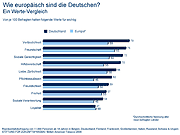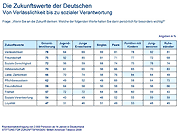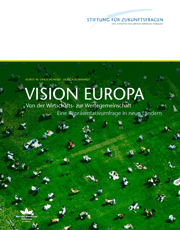Vision Europe: From an economic community to a community of values
Professor Dr Horst W. Opaschowski, Scientific Director of the Foundation: „Despite all the euphoria about the New Europe, the question of social justice must be asked anew, because the gap between rich and poor is widening and conflicts are looming. Social coexistence is therefore at the centre of Europeans“ desires and values." Friendship (65%), social justice (60%) and reliability (59%) are at the top of Europeans' scale of values. However, values such as love (58%), helpfulness (55%), freedom (53%) and friendliness (50%) also meet with majority approval. In contrast, loyalty (48%), a sense of duty and social responsibility (46% each) are only mentioned by a minority of Europeans.
At the same time, the country comparison study raises the question of cliché and reality anew. In terms of value orientation, loyalty dominates among the British and a sense of duty among the Germans, a sense of justice among the Finns and a sense of responsibility among the Swiss, while the Russians think little of friendship and the Italians even less of reliability. What appears to be a collection of clichés is, according to the self-assessment of the population groups in the individual countries, a reflection of the reality of European values in the 21st century. Opaschowski: „Perhaps there is no such thing as ’the’ European values any more than there are “the' Europeans. At best, we are Germans, Finns or Italians - but we feel European." Is the Europe of the future just a common roof under which everyone finds space and protection, but everyone can live for themselves and be happy in their own way? Can the European aspect of Europe only be described negatively as what it is not - not Asia, not China and not the USA?
How European are the Germans?
A comparison of values
In Germany, a change in values with a positive basic direction is emerging. The project manager of the new European study, Dr Ulrich Reinhardt: „The focus is on pro-social values that are geared towards people living happily together. Especially in comparison with other countries, there is a need for more values in Germany. For example, the mentions for helpfulness, a sense of duty and reliability are nowhere higher.“ However, German citizens are also above the European average when it comes to friendship, love, freedom, friendliness, social justice and responsibility. Only the value of loyalty does not find a majority within the German population and is below that of the other nations.
Germans have different goals depending on their stage of life:
- Young people believe in the value of friendship, freedom and love - but think little of a sense of duty, social responsibility and loyalty.
- Couples prioritise reliability, love and a sense of duty - but value friendships and helpfulness less highly.
- Singles want to be free, believe in loyalty and friendship - reliability, helpfulness and social responsibility are cited less frequently than average by singles.
- For families, love is more important than anything else - but helpfulness and a sense of duty take a back seat.
- Young seniors demand social justice and responsibility, and place somewhat less value on love and friendships.
- Retirees are just as likely to demand helpfulness and a sense of duty as friendliness and social responsibility - but they place less value on freedom and love.
„Europe for all”: A future for all
The European Union formulates it programmatically: „Europe - united in diversity.“ The Europe of the future will remain a Europe of people and will be almost boundlessly diverse - even within individual countries. What is supposedly „typically German“ could then also be typically Spanish, Finnish or British. And that will remain the case. At the same time, the desire for demarcation is growing: the Bavarian does not want to be Prussian, the Scot does not want to be English and the Catalan does not want to be Spanish. The endearingly provincial and patriotic is the true home of Europeans. Opaschowski: „Culture and history as well as traditional social norms that are passed down from generation to generation may be one explanation for the specific character of a country. Nevertheless, there is a fundamental commonality among citizens in the New Europe: it is the shift from a value-orientation that guarantees survival to a value-orientation that increases well-being.“ The Europe of nations and regions will become a Europe of hopes and desires that still has a great future ahead of it.
Research information
Nations surveyed: Belgium, Germany, Finland, France, Great Britain, Italy, Russia, Switzerland, Hungary
Sample size: A total of 11,000 people aged 14 and over
Method: Representative face-to-face survey
Publication: The detailed Europe study is available under the title: "Vision Europe. From economic community to community of values".





